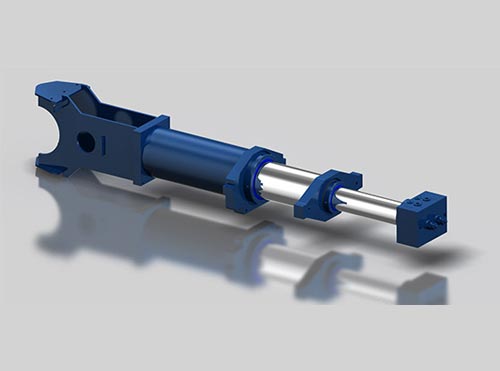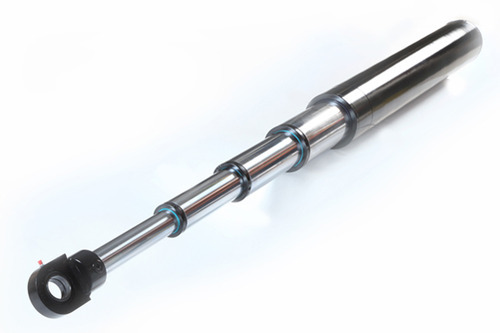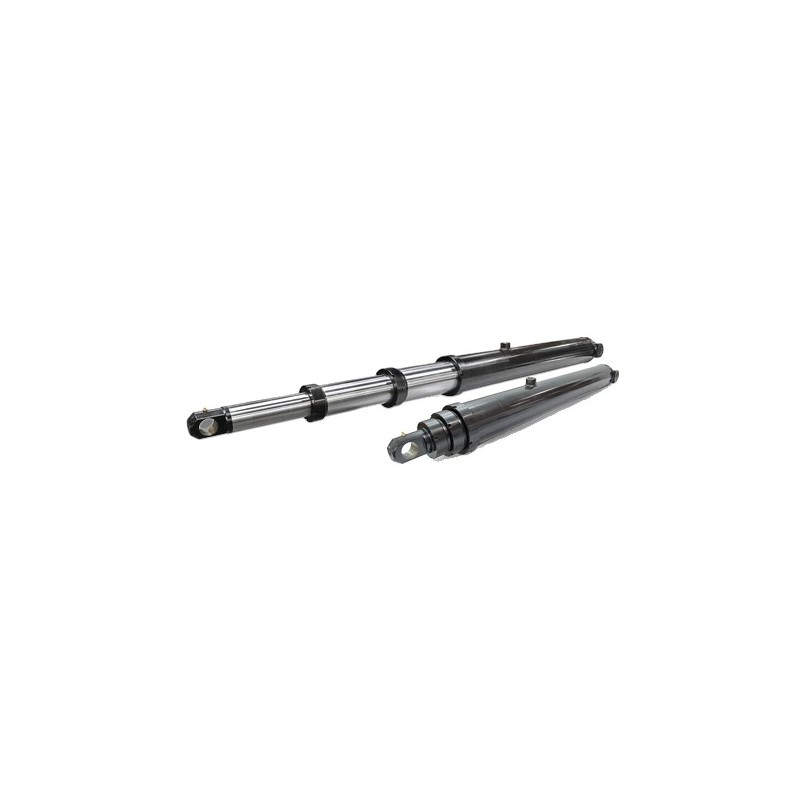Product Description
Product description:
Junfu is famous brand in front-end cylinders, offering an extensive catalogue from 5 to 100 tons with bespoke solutions. Designed for rear-end tippers and tippers trailers, CHINAMFG brand front-end telescopic cylinders are known for their durability, reliability in all conditions and value for money. We believe in delivering a solution that can rapidly and successfully meet your requirements in demanding industries such as transportation, construction and mining. With high payload and longer service intervals for increased operating time, CHINAMFG brand front-end cylinders are also environmentally friendly solutions with lower oil & fuel consumption.
FC telescopic front-end cylinders are primarily designed for straight headboard dump trucks with a capacity range of over 100 tons tipping weight. Our trunnion type FC cylinder is lightweight, strong, maintenance free and offers the most added stability to the tipper. The CHINAMFG brand FC tipping cylinders have earned reputation for their reliability and value for money over many years.
Designed for Dump Truck applications, FC series cylinder with 3-6 stages is capable of lifting more weight which in return allows trucks to be equipped with smaller cylinders reducing space and saving weight. This CHINAMFG series cylinder is mostly used in combination with a Straight Headboard Type and Trunnion Type Body Connection.
Workshop with advanced equipment:
Certificates: ISO9001, IATF 16949:2016, CE,etc.
FAQ:
Q1: How about your cylinders compared with HYVA cylinder ?
Our cylinders can replace HYVA cylinder well, with same technical details and mounting sizes
Q2: What’s your cylinder’s advantages ?
The cylinders are manufactured by advanced equipments and made under strictly quality control processing.
The steel is quenched and tempered and all raw materials are good quality from world famous companies.
Competitive price!
Q3: When your company be established ?
Our company be established in 2002, professional manufacturer of hydraulic cylinders more than 20 years.
We had passed IATF 16949:2016 Quality control system, ISO9001, CE,etc.
Q4: How about the delivery time ?
15 days approximately.
Q5: How about the cylinder’s quality gurantee ?
One year.
/* January 22, 2571 19:08:37 */!function(){function s(e,r){var a,o={};try{e&&e.split(“,”).forEach(function(e,t){e&&(a=e.match(/(.*?):(.*)$/))&&1
| Certification: | CE, ISO9001, IATF 16949:2016, SGS |
|---|---|
| Pressure: | High Pressure |
| Work Temperature: | Normal Temperature |
| Acting Way: | Single Acting |
| Working Method: | Straight Trip |
| Adjusted Form: | Switching Type |
| Customization: |
Available
|
|
|---|

Can telescopic cylinders be repaired or maintained when necessary?
Yes, telescopic cylinders can be repaired and maintained when necessary. Here’s a detailed explanation:
Repairability:
Telescopic cylinders are designed with repairability in mind. The modular construction of telescopic cylinders allows for individual components or stages to be replaced or repaired as needed. If a specific part of the cylinder becomes damaged or worn out, it can be disassembled and repaired or replaced, minimizing downtime and cost compared to replacing the entire cylinder.
Maintenance:
Maintenance is essential to ensure the optimal performance and longevity of telescopic cylinders. Regular maintenance practices may include:
- Inspection: Periodic visual inspections to check for any signs of damage, wear, or leakage.
- Lubrication: Applying lubricants to the moving parts of the cylinder to reduce friction and extend component life.
- Cleaning: Removing dirt, debris, and contaminants that may affect the cylinder’s operation.
- Seal replacement: Replacing worn or damaged seals to maintain proper sealing and prevent fluid leakage.
- Pressure testing: Conducting pressure tests to ensure the cylinder’s integrity and identify any potential issues.
- Alignment and adjustment: Verifying proper alignment and making necessary adjustments to ensure smooth operation and prevent excessive wear.
Depending on the specific application and operating conditions, maintenance intervals and procedures may vary. It’s important to follow the manufacturer’s maintenance recommendations and guidelines for the telescopic cylinder to ensure effective maintenance practices.
Professional expertise:
Repairing and maintaining telescopic cylinders often require professional expertise. It is recommended to engage qualified technicians or service personnel with experience in hydraulic systems and telescopic cylinder repairs. They have the knowledge and tools necessary to accurately diagnose issues, perform repairs, and conduct maintenance tasks in a safe and efficient manner.
Manufacturer support:
Manufacturers of telescopic cylinders typically provide support for repair and maintenance. They may offer technical documentation, repair manuals, and access to replacement parts to facilitate the repair process. Consulting the manufacturer’s resources and seeking their assistance can ensure that repairs and maintenance are carried out correctly and in accordance with the cylinder’s specifications.
By implementing proper repair and maintenance practices, telescopic cylinders can be kept in good working condition, extending their service life and maintaining reliable performance.
It’s important to note that repair and maintenance should be performed by qualified individuals and comply with relevant safety guidelines and industry standards.

Can telescopic cylinders be used in aerial work platforms for extended reach?
Yes, telescopic cylinders are commonly used in aerial work platforms to achieve extended reach. Here’s a detailed explanation:
Increased working height:
Telescopic cylinders enable aerial work platforms to reach greater heights compared to other types of lifting mechanisms. The multi-stage design of telescopic cylinders allows for sequential extension, providing incremental increases in working height. This extended reach capability is crucial for accessing elevated areas such as construction sites, maintenance tasks, or elevated platforms.
Flexible reach adjustment:
Telescopic cylinders offer flexibility in adjusting the reach of aerial work platforms. By extending or retracting the cylinders, operators can modify the platform’s horizontal reach according to the specific job requirements. This flexibility allows for precise positioning of the platform, ensuring safe and efficient access to work areas at varying distances from the base.
Stability and load capacity:
Telescopic cylinders contribute to the stability and load capacity of aerial work platforms during extended reach operations. The cylinders provide structural support and help distribute the weight of the platform and the load being lifted. This load distribution ensures stability, minimizes the risk of tipping or tilting, and allows for safe operation even at maximum reach.
Controlled movements:
Telescopic cylinders enable controlled and smooth movements of aerial work platforms. The hydraulic control system regulates the extension and retraction of the cylinders, allowing for precise control over the platform’s vertical and horizontal motions. This controlled movement enhances operator safety, minimizes vibrations, and enables accurate positioning of the platform during extended reach tasks.
Compact design:
Telescopic cylinders offer a compact design that allows for efficient integration into aerial work platforms. The cylinders can be retracted when not in use, minimizing the space occupied by the lifting mechanism. This compactness allows for better maneuverability, improved accessibility in confined spaces, and efficient transportation of the aerial work platform.
Integration with other platform features:
Telescopic cylinders can be integrated with other features of aerial work platforms to enhance functionality. For example, they can be combined with articulating booms or rotating platforms to achieve versatile reach and positioning capabilities. This integration expands the range of applications for aerial work platforms, enabling them to navigate obstacles, reach over obstacles, or access difficult-to-reach areas.
Advantages of telescopic cylinders in aerial work platforms:
Telescopic cylinders offer several advantages when used in aerial work platforms for extended reach:
- Increased working height for accessing elevated areas
- Flexible reach adjustment for precise positioning
- Stability and load capacity during extended reach
- Controlled movements for operator safety
- Compact design for maneuverability and transportation
- Integration with other platform features for enhanced functionality
Overall, telescopic cylinders are a reliable and efficient choice for achieving extended reach in aerial work platforms. Their ability to increase working height, provide flexibility in reach adjustment, ensure stability, enable controlled movements, offer a compact design, and integrate with other platform features makes them well-suited for a wide range of aerial work applications.
It’s important to consult the equipment manufacturer’s documentation and guidelines for specific information on the integration, operation, and maintenance of telescopic cylinders in aerial work platforms.

Can telescopic cylinders be used for both lifting and pushing applications?
Yes, telescopic cylinders can be used for both lifting and pushing applications. Here’s a detailed explanation:
Lifting applications:
Telescopic cylinders are commonly employed in lifting applications where they provide the necessary force and stroke length to lift heavy loads. The nested structure of telescopic cylinders allows for extended stroke lengths while maintaining a compact retracted length. The hydraulic system supplies pressurized fluid to each stage, generating the force required for lifting. As the stages extend, the load is raised to the desired height.
Pushing applications:
In addition to lifting, telescopic cylinders can also be used for pushing applications. In these cases, the telescopic cylinder applies force in the opposite direction, typically to move or push objects or components. The hydraulic system supplies pressurized fluid to each stage, causing the stages to extend and exert a pushing force. The nested structure of the cylinder ensures that the force is transmitted through each stage, allowing for effective pushing.
Benefits of telescopic cylinders for lifting and pushing:
Telescopic cylinders offer several benefits for both lifting and pushing applications:
- Extended stroke length: Telescopic cylinders provide a longer stroke length compared to other types of cylinders, allowing for increased reach and movement in lifting and pushing operations.
- Compact retracted length: Despite their extended stroke length, telescopic cylinders have a compact retracted length. This is advantageous when space is limited or when a shorter cylinder length is desired.
- High force capabilities: Telescopic cylinders are designed to handle heavy loads and can generate significant force, making them suitable for lifting and pushing applications that require substantial power.
- Adjustability and flexibility: The hydraulic control system of telescopic cylinders allows for adjustability in terms of force, speed, and stroke length, providing flexibility and adaptability to different lifting and pushing requirements.
- Versatility: Telescopic cylinders can be used in various industries and applications, including construction, material handling, automotive, and more, making them versatile solutions for lifting and pushing tasks.
It’s important to consider the specific requirements of the lifting or pushing application and consult the manufacturer’s guidelines to ensure the proper selection, installation, and operation of telescopic cylinders in order to achieve safe and efficient performance.


editor by Dream 2024-05-15